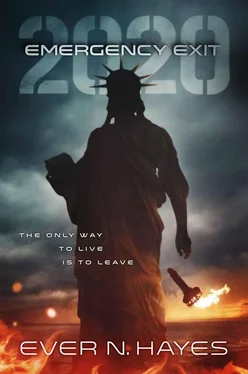Yesterday morning Sam had brought a cup of coffee out to his dad and remarked that he hadn’t seen anyone passing by in days. The longer Wes thought about it, the more that fact began to bother him too. It had been a while. Almost five days. They hadn’t seen a single flying duck either, even though they were camped just outside the preserve. On the other hand, plenty of dead fish and birds had washed up on their private shoreline. These were bizarre and bad signs, leaving no doubt that there was at least something wrong with the water. Wes had to find out what was going on.
He had driven into town leery and yet not the least bit prepared for what he discovered. He found the wreckage from dozens of car accidents and dead bodies everywhere, but he didn’t encounter another living soul. He was glad he’d left the boys back at the cabin; they wouldn’t have handled this well. Whatever this was, he didn’t know how he and his boys could have possibly survived it. It had clearly spared nothing else. Their cove on the lake must have sheltered them somehow, but that had to have been pure luck. The frozen expressions and darkened dried skin on the victims suggested some powerful form of biological agent was responsible. It seemed to have taken their oxygen away rapidly, if not instantly. They’d had little or no time to react.
Wes tried to call home on his phone but there was no reply. He found another phone next to a body and tried it as well. No luck. He drove down the street to the local pharmacy and threw a brick through the door and each of the front windows, creating as much airflow as possible—in case any of the chemicals had been trapped inside.
He waited twenty long minutes before entering, then quickly loaded up garbage bags with medicine, facemasks, and wound/injury treatment supplies. Finally, he hopped behind the counter for morphine, oxycodone, and other more powerful drugs—anything he thought they might possibly need at some point. He had no idea what exactly they were up against or how much of the area was affected by it, but he knew it was severe. In all his years of war experience, including time he spent in quarantine zones, he’d never seen anything like this.
Wes made one more stop, this time at the grocery store, loading up his truck with dry supplies and bottled water, before returning to the lodge. He told his boys a condensed version of the horror he’d witnessed. Their thoughts went immediately to home as well. They too tried repeatedly to call friends and family but received no reply. Wes convinced his boys there was nothing more they could do from the lodge and everyone was likely dead. Left to assume the worst, and unable to find any radio signals on the shortwave radio, they moved their supplies into the bunker beneath the lodge and locked themselves in. This custom fortress was the only security they had.
At sixty-two, with over a decade of service in the Army Corps of Engineers and another seven years as a Navy SEAL, Wes had a rather unique skillset. He wouldn’t exactly have considered himself a doomsday prepper, but he was ready for a fight, and the custom-made bunker under his lodge was built to withstand a direct missile hit and make them invisible from all radar. It was possible to blow open the roof by digging it up and using explosives, but no one outside his family even knew the bunker was there. The entrance was concealed by a lift-gate in the floor of the cabin’s fireplace and could be locked into place from below.
It had taken him and Sam a year just to design the main bunker room and its adjacent tunnel. It then took another seven years to safely excavate and stabilize the living space and quarter-mile passage into Sully’s Hill, behind the lodge. The tunnel ran from the room below his lodge to a large pile of boulders—above them in the woods—one of which could be moved outwards and aside as an exit. A second emergency exit was masterfully built through a revolving wall capsule that led directly into the cove below their cabin, completely hidden from outside view. Inside the bunker, it looked like nothing more than a giant fish tank. The tunnel to the cove had been more difficult to build and was much steeper than the tunnel up Sully’s Hill. With double doors built to a submarine’s codes, the hatch room could be safely filled with water, allowing people in and out without leaking so much as a drop into the bunker. It was Army Corps of Engineers technology used in the most advanced way, a small-scale underground Hoover Dam. Wes never intended the cove exit to be used, but he had a dozen sets of scuba gear on hand for each of his family members. Just in case. The ventilation system he had installed was able to heat and cool the bunker with minimal sound, and it also redistributed trapped heat directly through the water of the lake. It was another example of his engineering genius and something he’d always been quite proud of. No matter the level of technology, no one would ever know there was a chamber under this cabin. In theory .
His two boys were in their mid-twenties with families of their own, and this bunker and tunnel had served as quite the entertaining fort for his six grandkids. It had been fun to build, and he’d invested a moderate fortune from his savings into decking it out. Although Wes liked to be prepared, he never figured he’d have to use it for self-preservation in his lifetime and didn’t think he’d have to worry about any form of terrorism in North Dakota. The North Dakota oil supply, one of the world’s largest only a decade ago had been wastefully drilled and drained by the U.S. government. There was little of value up here anymore, other than a few nice ranches and golf courses. Wes couldn’t help but wonder what the devastation outside was about, and who exactly was behind it. What could they possibly want? And how far reaching was the destruction?
Unable to reach anyone on their contact list—in any state—or find anything on the radio, Wes and his boys sat for hours and discussed their limited options. Before they could come up with any sort of plan they noticed movement on one of their many monitors. People!
Through the bunker’s high-tech surveillance system, they watched a group of people pull in across the lake and begin hiding their three trucks. They appeared to be hiding, but from what? He watched his screens for signs of pursuit, but saw nothing. Four men did the work covering the trucks, but there were clearly more people in the vehicles. The sun was up now, and they were scrambling to complete the camouflage effort, and doing a dang good job of it.
His initial instinct was to contact them. They had to know something. But the possibility loomed that they could be among the ones responsible for the devastation. They could be fleeing from U.S. troops. Going over there or bringing them here would give away the one advantage he had. Right now, he knew he had to sit, watch, and wait.
He and his sons remained in the bunker, watching the world beyond the walls of their lodge through their remote cameras. The people across the lake remained mostly invisible throughout the day. Several of his exterior cameras had sound capabilities, and they picked up planes flying overhead a couple times throughout the day. He caught a glimpse of one of them and froze the frame to get a closer look. It turned out it wasn’t a plane at all, but some kind of drone. He could make out the word “FOTROS” on the tail. The Internet was down, so he couldn’t look up where the drone was from, but he knew one thing for certain: it wasn’t American. So did that mean the people across the lake were?
TWELVE: (Ryan) “Off the Mark”
Mark was a jumpy guy. Beefy, hairy, bald, and pretty arrogant, he wasn’t afraid to promote his own toughness and self-importance. After thanking us for saving his life, while insisting he could have handled everything himself, he went on to tell us all he knew about the attacks. Or didn’t know . We listened but became less and less comfortable with his presence as the day went on. The guy was a total a-hole.
Читать дальше












